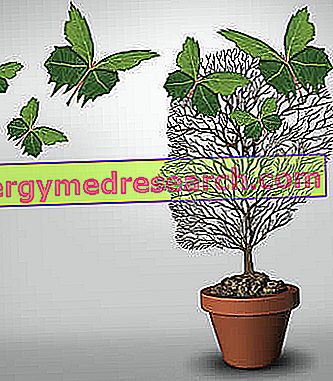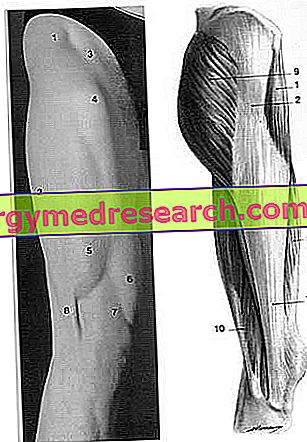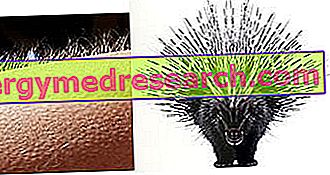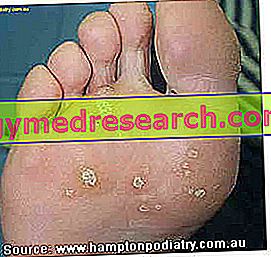Depression is a psychiatric illness. On the other hand, in the common language depression is also called the appearance of some isolated and not too serious symptoms.

Depressive diseases are quite different from each other and both diagnosis and treatment are difficult to establish with accuracy.
A first subdivision concerns:
- Depressive disorders: major, dysthymic and not otherwise specified.
- Bipolar disorders: type I, II and cyclothymic.
There are two factors that determine depression and often they are present together. These increase the chances of getting sick, but do not provide any clinical certainty:
- Biological factor: it is a hereditary element that implies physical predisposition. They are involved: glands, hormones, neurotransmitters and nervous receptors.
- Psychological factor: it consists in a greater vulnerability to the disease and often rooted in negative childhood experiences.
What to do
It is not always easy to distinguish a "difficult period" from actual depressive symptoms.
Early diagnosis is very often hindered by shame and rejection of this condition.
Below we will list some useful tips for recognizing a depressive symptom and suggest how to intervene.
- It is necessary to prevent the consolidation of symptoms and the aggravation of the disease by making an early diagnosis.
- Depression often begins with some simple, apparently "physiological" moods, even if more intense, repeated and close together:
- Negative perception of events.
- Sadness and irritability.
- Feeling of "depression" (it is often called such, but this word is used very often inappropriately, while we tend to omit it when the doubt is stronger).
- In this first phase it is very important to try to reverse the mood trend as a preventive action.
- If left untreated, these symptoms can develop into a purely clinical condition and determine the appearance of:
- Depressed mood all day and for several days.
- Inability to experience pleasure during normally rewarding activities.
- Unmotivated or excessive irritability, negativity and emotional pain.
- Anhedonia (tiredness, fatigue, lack of energy).
- Abnormal increase or reduction in appetite.
- Sleep disorders.
- Slowing or motor agitation.
- Lack of concentration.
- Feeling of failure, guilt (own or others) and uselessness.
- Tendency to isolation.
- Recurring thoughts on suicide.
- The most important diagnostic aspect is the pervasiveness of the symptoms (that is, constancy and duration), but it is not certain that all will occur at the same time.
- Having the suspicion of suffering from a depressive disorder it is necessary to consult a doctor immediately:
- Primary care physician for the first approach: usually prescribes light medications to facilitate spontaneous remission.
- Specialist: psychiatrist or neurologist. It is able to more accurately identify the type of disorder and prescribe a specific therapy.
- Therapist: psychologist - psychotherapist. It identifies the psychological mechanism that causes the mood disorder and intervenes by modifying the mental pathways, the processing system and so on. It does not prescribe drugs.
- That said, some very important tips for prevention (at the first symptoms) and also for treatment are:
- Do not abandon customary activities.
- Attend the community.
- Respect a balanced diet.
- Practicing physical activity.
- Do not abuse psychotropic substances: alcoholism, drugs, smoking, binge eating desorder (compulsive eating).
- Avoid only the circumstances that really cause suffering.
- Dedicate yourself to interesting activities that are able to "disconnect the brain" from brooding (constantly thinking about the future) or from aluminum (constantly thinking about the past).
- Abandoning clichés, trying to overcome shame and seek help in times of need. Addressing a specialist early on, in most cases the problem can be solved with light interventions and without leaving too significant experiences.
- Ultimately, the main remedies are:
- Psychotherapy.
- Pharmacological therapy.
- Combination of both.
What NOT to do
- Give up an early diagnosis by not talking to your doctor.
- Stop the diagnostic procedure if the general practitioner advised a specialist visit.
- Underestimate the bad mood and the recurrent negative attitudes.
- Surrendering to anhedonia and interrupting most activities (work, sports, hobbies, social relations, etc.).
- Neglecting sleep and not regularizing it.
- Neglecting the diet.
- Insulate yourself.
- Continuously brood and ruminate.
- Avoid or stop drug therapy.
- Avoid or stop psychotherapy.
- Abusing psychotropic substances.
- Tend to self-harm and strive to deal with particularly uncomfortable circumstances.
What to eat
The nutritional role in depressive pathology is controversial.
There are scientific bases that suggest a correlation, but the real impact is not always so significant (see also: Diet and Depression: preventing it at the table).
In general we recommend:
- Adopt a normocaloric and balanced diet. Sometimes it requires special effort, since some drugs used in the treatment have an anorectic effect.
- Respect a diet with the right fraction of carbohydrates.
- Hypoglycemia and a possible ketoacidosis caused by fasting or a low carb diet alter mood, creating a "fluctuating" trend.
- Hyperglycemia caused by a diet too rich in carbohydrates can lead to a decrease in the use of glucose by brain tissue, confusion, slowing down and lethargy.
- If desired, take a portion of coffee on morning awakening (the worst moment for the depressed); can improve mood, as long as it does not interfere with the pharmacological action.
- Promote the consumption of foods rich in omega 3: guarantee the integrity of neurons; therefore also their functionality. They are abundant in fishery products, in certain oil seeds (flax, kiwi, grape seeds, soya, etc.) and related oils, krill oil, cod liver oil, etc.
What NOT to Eat
- Avoid low-calorie diets, as they increase the risk of worsening symptoms.
- Avoid excess drinks, supplements and highly stimulating foods such as: coffee, tea, energy drink, cocoa, dark chocolate, etc. It is especially important in bipolar pathologies, in abuse tendencies and in clinical pictures characterized also by anxious symptoms.
- Avoid taking alcoholic beverages: they increase the risk of abuse and negatively affect drug metabolism. Anhedonia can worsen.
- Avoid foods that are very rich in histamine: it has a stimulating action that can compromise the pharmacological action or trigger severe headaches and worsen anxiety. It is present mainly in fishery products (blue fish) and increases significantly with poor storage.
- Avoid foods rich in tyramine: it is a derivative of the amino acid tyrosine. Like the previous one, it is a marker of poor conservation. It stimulates the release of norepinephrine predisposing to tachycardia, headache, etc. It abounds in cheeses, in preserved meats, in soy sauce, in fish, in red wine and in other spirits, in bananas and in chocolate.
- Avoid foods rich in glutamate: it is an amino acid that acts as an exciting neurotransmitter. Widely used in the food industry as a flavor enhancer, it abounds in the stock cube, in ready or freeze-dried soups etc. Excess is very difficult to achieve with diet, but it can happen in Chinese cuisine.
- Avoid excess cholesterol and saturated or hydrogenated fats (especially in trans conformation): they do not have a direct negative effect on depression, but a diet rich in these molecules is associated with a deterioration of brain function. Abound in junk foods like fast food, packaged foods, fatty cheeses, margarines, bifractionated oils etc.
- Avoid excess arachidonic acid: it is an omega 6 derived from linoleic acid. It is abundant in some oil seeds and related oils (for example in peanuts and extraction oil). Especially when associated with an omega 3 deficiency, the excess of arachidonic acid seems to worsen brain function.
- Do not follow diets without carbohydrates or with too many carbohydrates (see What to Eat).
Natural Cures and Remedies
Among the most effective natural remedies for mild depression we recognize:
- Regular motor physical activity: it creates an endorphinic release that can greatly alleviate the symptoms.
- Psychotherapy: see under Medical Treatments.
- Relaxing activities that allow the interruption of the continuous scrubbing-aluminum cycle, allowing the brain to "metabolize" thoughts:
- Advanced relaxation techniques: of any kind. Some are katabasis, shiatsu, watsu, maternage etc.
- Transcendental meditation.
- Mental training: induced or autogenic.
- Yoga: especially pranayama useful.
- Aromatherapy.
- Herbalist: they are considered useful against mild depression: herbal teas, decoctions and warm solutions enriched with essential oils that contain:
- Hypericum: it is the most effective. It has an inhibiting action towards the re-uptake of noadrenaline and serotonin in a manner comparable to tricyclics or to serotonin and noradrenaline reuptake inhibitors.
- Valerian.
- Eleutherococcus.
- Passiflora.
- Chamomile.
- Lime.
- Peppermint.
- Hawthorn.
- Elder.
- Mistletoe.
- Hop.
Pharmacological care
- Tricyclic antidepressants: used mainly in the treatment of medium and severe depression. They are the least used because of the side effects:
- Amitriptyline: eg Laroxyl, Triptizol, Adepril.
- Imipramine: for example Imipra C FN, Tofranil.
- Nortriptyline: for example Dominans, Noritren.
- Others are: clomipramine, dosulepina, doxepina, trazodonelo, fepramina.
- Selective serotonin reuptake inhibitors: second-generation antidepressants that have replaced tricyclics due to fewer side effects, as they lack the cholinergic action:
- Fluoxetine: for example Prozac, Azur, Flotina, Fluoxeren.
- Citalopram: for example Seropram.
- Sertraline: for example Zoloft, Tralisen.
- Noradrenaline and dopamine reuptake inhibitors:
- Bupropion: for example Elontril, Wellbutrin, Zyban.
- Serotonin and norepinephrine reuptake inhibitors:
- Duloxetine: for example Xeristar, Yentreve, Ariclaim, Cymbalta.
- Venlafaxine: for example Efexor.
- Monoamine oxidase inhibitors (MAOIs): are second choice drugs due to the side effects they can generate.
- Fenelzina: for example Margyl.
- Isocarboxazide: for example Marplan.
- Tranylcypromine: for example Parmodalin.
Prevention
The prevention of depression can be adopted in special circumstances:
- Familiarity with the disease: recognition of biological and / or psychological factors.
- Positive clinical history: those who have already suffered from depression are prone to recurrences.
- Particularly traumatic negative events: they are very subjective and should not be underestimated, even if from an external point of view they may seem negligible.
The basic rules for preventing and reducing depressive symptoms can be summarized as follows:
- Strive to maintain a normal lifestyle and carry out customary activities.
- Attend the community and not isolate themselves.
- Remember that the aluminum and the brooding do NOT lead to any solution; on the contrary, they tend to aggravate the symptoms.
- Rationalize your condition and always act for your own good, putting aside guilt, shame and resentment.
- Respect a balanced diet by avoiding fasting, overeating and attitudes that can introduce possible eating disorders (anorexia, bulimia, binge eating desorder, grignottage).
- Practice physical activity, but avoid becoming a stressful activity.
- Cut out time for activities that can gratify and improve mood.
- Totally avoid psychotropic substances (alcohol, drugs, nicotine, etc.).
- If possible, eliminate all inconvenient circumstances.
- Consult a specialist.
Medical Treatments
- All forms of psychotherapy are part of this category. The most used is Cognitive-Behavioral Psychotherapy (TCC): it is quite effective, although sometimes it requires an antidepressant pharmacological support or mood regulator. It consists in becoming aware of the vicious circles that cause the disease, eliminating them with the reactivation of behavior, thinking and thanks to more suitable behaviors. Furthermore, he works a lot on relapse prevention.



